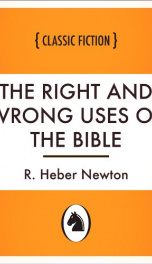The Right and Wrong Uses of the Bible

It has been my custom for several years to give occasionally a series ofsermons, having in view some systematic instruction of the peoplecommitted to my care. Such a series of sermons on the Bible had been forsome time in my mind. With the recurrence of Bible-Sunday in our Churchyear, this thought crystallized in the outline of a course that shouldpresent the nature and uses of the Bible, both negatively and positively,in a manner that should be at once reverent and rational. In the course ofthis parochial ministration public attention was called to it in a waythat has rendered a complete report of my words desirable.The views set forth in these sermons were not hastily reached or lightlyaccepted. They represent a growth of years. Their essential thought wasstated in a sermon that was preached and published eight years ago. Mypositions concerning certain books, etc., have been taken in deference towhat seems to me the weight of judgment among the master critics. They areopen to correction, as the young science of Biblical criticism gains newlight. The general view of the Bible herein set forth rests upon theconclusions of no new criticism. In varying forms, it has been that of anhistorical school of thought in the English Church and in its Americandaughter. It is a view that has been recognized as a legitimate child ofthe mother Church; and that has been given the freedom of our ownhomestead, in the undogmatic language of the sixth of the Articles ofReligion of the Protestant Episcopal Church. It is distinctly enunciatedin the first sentence of the first sermon in the Book of Homilies, setforth officially for the instruction of the people in both of theseChurches. "Unto a Christian man there can be nothing more necessary or profitable than the knowledge of holy scripture, forasmuch as _in it is contained God's true word_, setting forth his glory, and also man's duty."The whole controversy in Protestantism over the Bible may be summed intothe question whether the Bible _is_ God's word or _contains_ God's word.On this question I stand with the Book of Homilies.These sermons were meant for that large and rapidly growing body of menwho can no longer hold the traditional view of the Bible, but who yetrealize that within this view there is a real and profound truth; a truthwhich we all need, if haply we can get it out from its archaic formwithout destroying its life, and can clothe it anew in a shape that we canintelligently grasp and sincerely hold. To such alone would I speak inthese pages, to help them hold the substance of their fathers' faith.
Info about the book
Author:
Series:
Unknown
ISBN:
1163407771
Rating:
3.5/5 (4)Your rating:
0/5
Languge:
English
Users who have this book
Users who want this book
What readers are saying
What do you think? Write your own comment on this book!
write a commentif you like The Right and Wrong Uses of the Bible try:
Other books by this author
Do you want to read a book that interests you? It’s EASY!
Create an account and send a request for reading to other users on the Webpage of the book!

